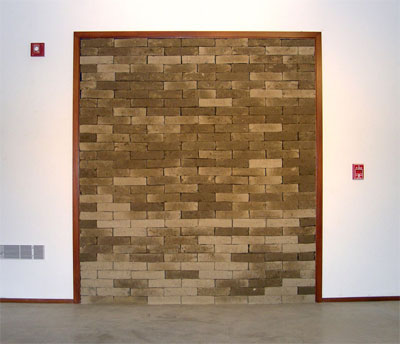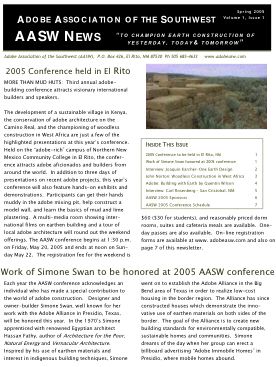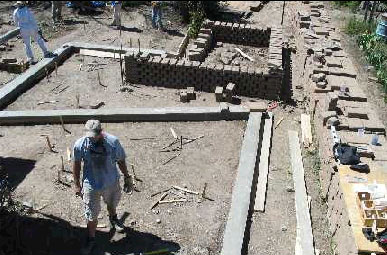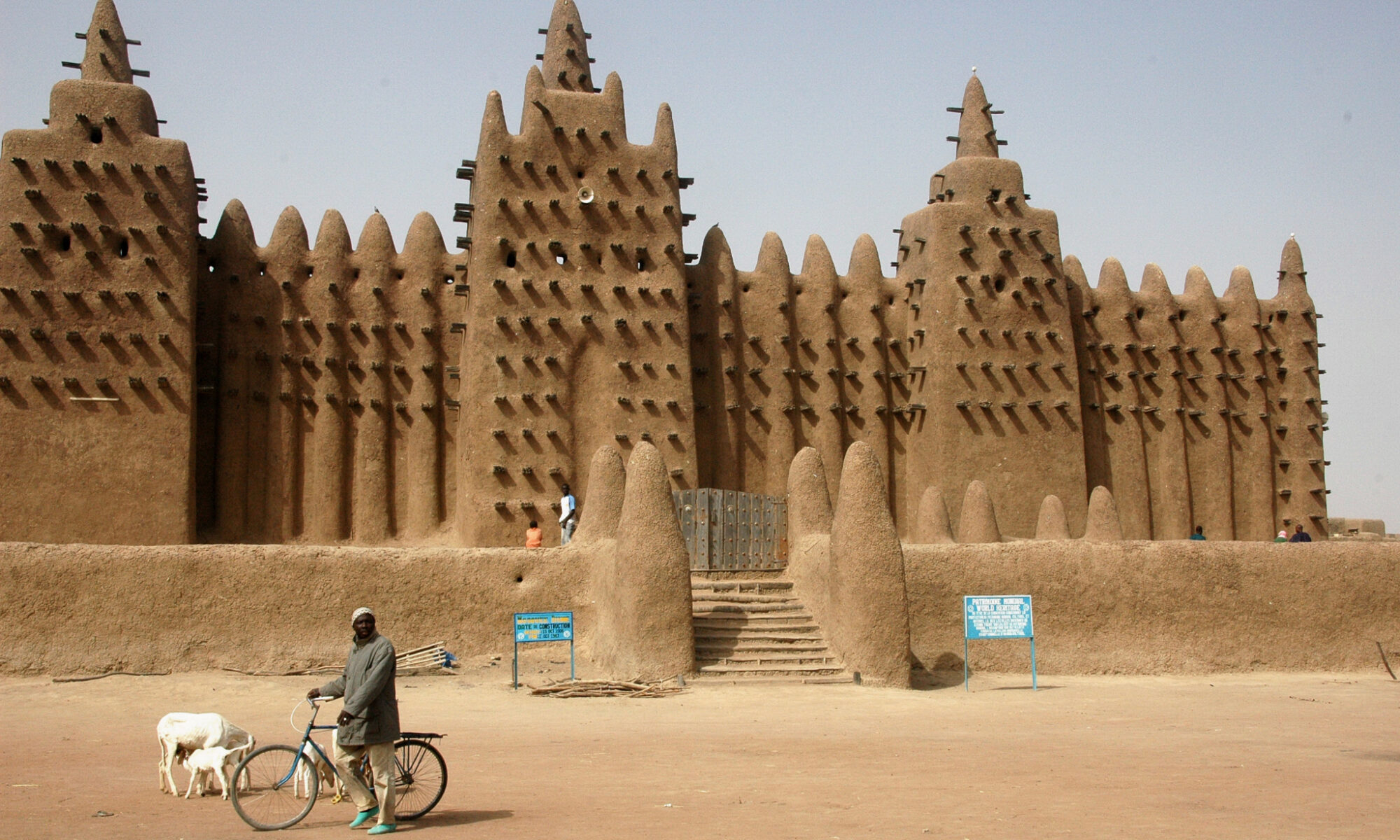On November 4-6, 2005, The Adobe Alliance will offer an intensive vault-building workshop. The group shall be limited to 20. We will build, as usual by hand, the beginnings of a vault since it takes two weeks to complete one. The first courses are the most difficult as it is essential to master the technique of inclining the first bricks properly against the back wall which will support part of the load of the vault (most of the load descends in exquisite equilibrium into the 18″ width of the earthen brick wall.) Hands-on instruction is given by project manager/ adobera Jesusita Jimenez and theory by Simone Swan, designer.Bring work clothes, hat, gloves, heavy shoes, sun protection, a bucket, a float and water. Primitive camping available on site but without water. Lodgings are available in Presidio and Ojinaga, Mexico (across the bridge). Potluck meals at Swan House and/or Thai catering. Participants are also invited during the three weeks prior to the workshop in order to build the sustaining walls for the vaulted roof. Interns receive room and board, first come first served! If an intern wishes to join our work in plastering between November 6th and 10th, please write us. Cost is $250 by October 20, $300 thereafter. Scholarships available. Download poster (PDF)
Earth Architecture at Cranbrook

Ginger Krieg, Dharmesh Patel, Paul Puzzello and Juan Torres, Students from the Cranbrook Department of Architecture, are experimenting with Hand formed soil/clay bricks. (non-fired) They built a wall from the bricks utilizing random soil found in the Detroit metro area. The dimensions of the bricks were 3″ x 6″ x 12″ comprised of only sifted soil and water. In the 10-day project approximately 400 bricks were produced. More images 1| 2 | 3
AASW Newsletter

The Adobe Association of the Southwest releases it’s first newsletter in conjunction with the 3rd annual Conference. Click here to download the newsletter in .pdf format.
Lak’a Uta Project
The Danish International Human Settlement Service has constructed several earth houses, called the The Lak’a Uta Project, on the Bolivian plateau. Together these houses make ‘Centro Lak’a Uta’. In the local language of Aymara ‘Lak’a Uta means ‘homes of earth’.
Rammed Earth at the Center for Alternative Technology
One of the largest environmental projects in the UK, with a lecture theatre’s walls built out of soil, has begun in mid Wales at the Centre for Alternative Technology (CAT).
Andy Goldsworthy’s Clay Wall
British environmental artist Andy Goldsworthy’s Clay Wall at the at the Ingleby Gallery 1998, Curve Gallery 1996-2000 and at Galerie Lelong 2000
Hassan Fathy

The Hassan Fathy web site is the first, and perhaps the most comprehensive, website on the great Egyptian architect. The site documents 105 projects with photos, essays and drawings and is available in English, French and Arabic.
AREA: Design + Build in Marfa, Texas

PROGRAM DATES FOR AREA SUMMER DESIGN+BUILD
June 1 – July 1 2005
AREA is a summer research+build workshop that engages a 90 year old abandoned mud-brick building, located in the town of Marfa, Texas, as the testing grounds for questioning the notion of detail, the theme of this years inquiry. Through a series of explorations that examine the process of making and unmaking in architecture, participants will design and build full-scale interventions that respond to a critical examination of place and program while addressing local/global and industrial/non-industrial agendas for architecture by employing raw earth as the primary building material in these investigations. Marfa serves as an ideal laboratory from where to study these issues. It is a town constructed almost entirely from mud-brick and transformed by rich historical, cultural and geographic forces. At 5,000 feet above sea level, it is one of the oldest cultivated areas in the United States. Located 60 miles from the U.S./Mexico border, Marfa is also home to the Chinati Foundation, an internationally renowned contemporary art museum, founded by Donald Judd, whose emphasis is on works in which art and the surrounding landscape are inextricably linked. Participants will have the opportunity to visit this extraordinary cultural and geographic landscape through a series of directed and self-guided field-studies. AREA is an initiative of the School of Architecture at Clemson University and made possible in part by the Adobe Alliance, a non-profit organization committed to the dissemination of traditional earth building technologies.
MORE INFORMATION AT: www.areainstitute.org
In Situ
In Situ is a U.K. based rammed earth company devoted to rammed earth construction, consultancy and research.
Design+Research+Build at the University of Arizona
The Design+Research+Build program at the University of Arizona has constructed several projects in rammed earth. Visit the programs website.
